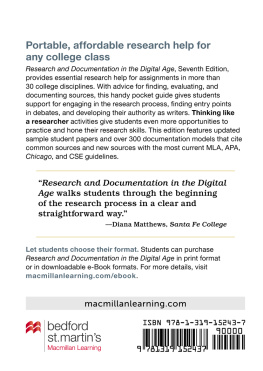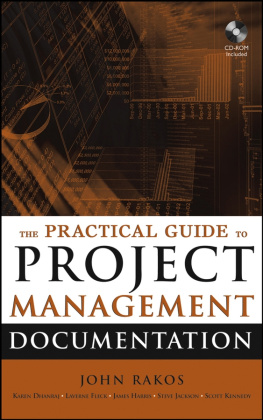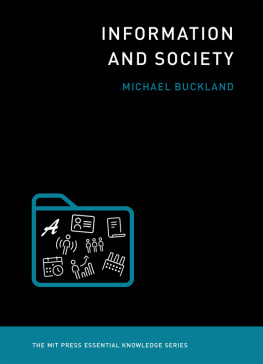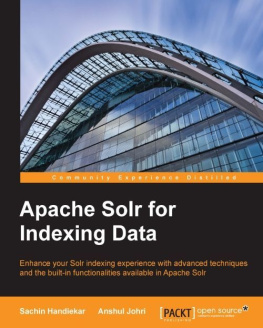Ronald E. Day - Indexing It All: The Subject in the Age of Documentation, Information, and Data
Here you can read online Ronald E. Day - Indexing It All: The Subject in the Age of Documentation, Information, and Data full text of the book (entire story) in english for free. Download pdf and epub, get meaning, cover and reviews about this ebook. year: 2014, publisher: The MIT Press, genre: Art. Description of the work, (preface) as well as reviews are available. Best literature library LitArk.com created for fans of good reading and offers a wide selection of genres:
Romance novel
Science fiction
Adventure
Detective
Science
History
Home and family
Prose
Art
Politics
Computer
Non-fiction
Religion
Business
Children
Humor
Choose a favorite category and find really read worthwhile books. Enjoy immersion in the world of imagination, feel the emotions of the characters or learn something new for yourself, make an fascinating discovery.

- Book:Indexing It All: The Subject in the Age of Documentation, Information, and Data
- Author:
- Publisher:The MIT Press
- Genre:
- Year:2014
- Rating:3 / 5
- Favourites:Add to favourites
- Your mark:
- 60
- 1
- 2
- 3
- 4
- 5
Indexing It All: The Subject in the Age of Documentation, Information, and Data: summary, description and annotation
We offer to read an annotation, description, summary or preface (depends on what the author of the book "Indexing It All: The Subject in the Age of Documentation, Information, and Data" wrote himself). If you haven't found the necessary information about the book — write in the comments, we will try to find it.
Ronald E. Day: author's other books
Who wrote Indexing It All: The Subject in the Age of Documentation, Information, and Data? Find out the surname, the name of the author of the book and a list of all author's works by series.
Indexing It All: The Subject in the Age of Documentation, Information, and Data — read online for free the complete book (whole text) full work
Below is the text of the book, divided by pages. System saving the place of the last page read, allows you to conveniently read the book "Indexing It All: The Subject in the Age of Documentation, Information, and Data" online for free, without having to search again every time where you left off. Put a bookmark, and you can go to the page where you finished reading at any time.
Font size:
Interval:
Bookmark:
Indexing It All
History and Foundations of Information Science
Edited by Michael Buckland, Jonathan Furner, and Markus Krajewski
Human Information Retrieval by Julian Warner
Good Faith Collaboration: The Culture of Wikipedia by Joseph Michael Reagle Jr.
Paper Machines: About Cards & Catalogs, 15481929 by Markus Krajewski, translated by Peter Krapp
Information and Intrigue: From Index Cards to Dewey Decimals to Alger Hissby Colin B. Burke
Indexing It All: The Subject in the Age of Documentation, Information, and Data by Ronald E. Day
Indexing It All
The Subject in the Age of Documentation, Information, and Data
Ronald E. Day
The MIT Press
Cambridge, Massachusetts
London, England
2014 Massachusetts Institute of Technology
All rights reserved. No part of this book may be reproduced in any form by any electronic or mechanical means (including photocopying, recording, or information storage and retrieval) without permission in writing from the publisher.
Library of Congress Cataloging-in-Publication Data
p. cm.
Includes bibliographical references and index.
ISBN 978-0-262-02821-9 (hardcover : alk. paper)
ISBN 978-0-262-32278-2 (retail e-book)
2014010632
10 9 8 7 6 5 4 3 2 1
Dedication: Once again, in admiration and friendship
Preface
Indexing It All: The Subject in the Age of Documentation, Information, and Data, gives a critical epistemic-historical account of the development of the modern documentary tradition and its mode of governmentality in the twentieth century and now the twenty-first. In these pages I argue that documentary indexing and indexicality play a major and increasing role in organizing personal and social identity and value and in reorganizing social and political life. This phenomenon has resulted in a rewriting of personal and social psychologies of the Western tradition of the past two hundred years, and it is altering notions of self and personhood, texts and textuality, and personal judgment and the role of critique in thought and politics. Today those foundations of Enlightenment thought, such as individual natural powers, freedom from surveillance, and the rights of speech, are routinely overrun and erased with the important aid of documentary systems in the service of state and corporate power and profit, in both democratic and nondemocratic states. Routinely and obsessively we use online resourceswhose algorithms and indexes both serve and profit from us in ways that the users are largely unawareas the way of overcoming the physical and emotional distances that are a consequence of modernity, and in particular capitalist modernity, where markets have become the means and the ends for reasoning, communication, and increasingly, emotion. These devices have become the governance structuresthe idea or conceptfor our human manner of being (subsuming other beings in this, as well), which increasingly subsume and subvert the former roles of personal judgment and critique in personal and social being and politics.
In writing Indexing It All as a critical epistemic-historical account of these events in twentieth- and twenty-first-century modernity, I intend to show the historical continuity of documentary techniques and technologies, which extend through documentation, information, and data and their sciences and runs through pre-computational and computational techniques and technologies. This book is an intellectual history of the modern role of documentary indexingdocumentary social, psychological, and political positioningand how such has shaped and continues to shape what the mid-twentieth-century French documentalist Suzanne Briet termed homo documentator (Briet 2006)documentary manin the information age. (I have more inclusively used the modern documentary tradition in this book for the term information age.)
Critical works, such as this book, attempt to bear witness to some event and to intervene in such. This book does both. We bear witness to the reality, violence, stories, and told and untold truths of events and to our own self-positioning and agency within these as best as we can reckon. We bear witness to the idea and image of an age and society and also attempt to intervene in such. By presenting the modern documentary tradition in terms of Hegelian dialectic in this work, I attempt to intervene through analytical and historical critique in the unfolding of the idea of an information age and information society that extends through a modern documentary episteme. In this book, by inversion, I give a critique of standard information age historiographies which broadly circulate in popular culture and even in scholarship (made up of celebration, endless optimism, works of individual genius, and the paradoxical eternal present in the invention of the technologically new). The narrative gives an account that attempts to connect the dots between usually separate traditions and explain the state of the documentary subject that we now find in late modern technological societies.
We live as social creatures and creatures of habit but with radical potentials. That radicalness is foundational for human beings. Though this book is rather dark in its vision upon its topic, it claims to constitute but one light upon the matter, and a light that is little shone. I hold with great admiration and affection libraries, archives, and other so-called documentary institutions and their at least three-thousand-year traditions. Without them, their professionals, and their traditions of service and duty, civilizations would not exist, and in their absence civilizations have fallen. This is not a minor observation or event, and I cant stress strongly enough, especially today in the face of their corporate takeover and replacement, the values of such public institutions. And, of course, the advent of the Internet and its technologies during my lifetime has brought about a wealth and accessibility of texts and knowledge that was unthinkable when I grew up; I have benefited greatly and hold with admiration this practical miracle and the work of the people and institutions that have contributed to this. But, at the same time, what these institutions and virtual sites have held and hold are texts of various natures, and it is in the reading of these texts, as texts, that the powers of any individual, group, or civilization appears and being is determined.
Documentary systems as widely deployed and accepted means, measures, and representations of beings and texts are a rather modern phenomenon, appearing only since the late eighteenth century. In the last century and a half these have gained an increasing foothold in creating and mediating both documentary subjects and objects according to an epistemology of representation, correspondence, and mutual abstraction and reduction. This is what I mean when I refer to the modern documentary tradition. Thinking through this tradition as a defining concept for being, knowledge, and governance in our modern age is what this book attempts to do.
Acknowledgments
This book wouldnt have been possible without the resources, suggestions, and corrections of a number of people. I would like to thank, in particular: Karl F. MacDorman and Selma abanovi for sharing their knowledge and expertise in android and robotic sciences, and Karl for his very generous and expert review and corrections of the chapter of this book that discusses androids and the uncanny valley; Michael Buckland for his (as usual) exemplary work, this time in reading, comments, and corrections of the entire manuscript, and in particular those sections of the book that discuss the transition in library and information science from documentation to information science; and of course, for introducing me to the work of Suzanne Briet many years ago and for his always generous support and inspiration; Lai Ma for her dissertation and for working with me, which led me to think more carefully about Michael Bucklands work among other things in this book; Neal Thomas of the University of North Carolina, whose brilliant work informs the core elements of the chapter on social computing and which helped me think about information needs more carefully than before; Mary L. Gray, who invited me to Microsoft Research in New England in order to talk about this book project and so kept this project alive when I thought otherwise. I am very grateful to Margy Avery at MIT Press, who made a great effort to hear my talk on the manuscript of this book and who accepted the book for publication and who, along with Katie Persons and Marcy Ross, to whom I am also grateful, saw it through publication. I also very much thank Mary Bagg for her careful and insightful copyediting; the book is considerably improved because of her. And, my thanks go to the anonymous readers who reviewed the initial manuscript. An earlier version of part of the chapter on citation indexing in this book appears in Blaise Cronin and Cassidy Sugimotos
Next pageFont size:
Interval:
Bookmark:
Similar books «Indexing It All: The Subject in the Age of Documentation, Information, and Data»
Look at similar books to Indexing It All: The Subject in the Age of Documentation, Information, and Data. We have selected literature similar in name and meaning in the hope of providing readers with more options to find new, interesting, not yet read works.
Discussion, reviews of the book Indexing It All: The Subject in the Age of Documentation, Information, and Data and just readers' own opinions. Leave your comments, write what you think about the work, its meaning or the main characters. Specify what exactly you liked and what you didn't like, and why you think so.






